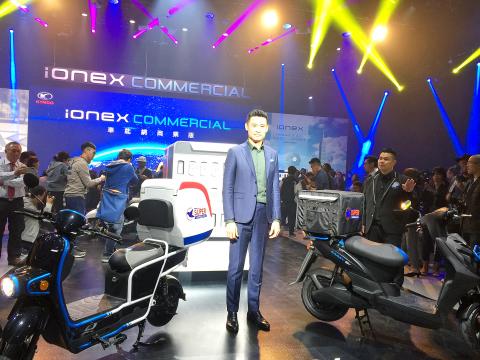Kwang Yang Motor Co (光陽工業), the nation’s largest manufacturer of gasoline-powered scooters, yesterday said it plans to make inroads into India’s electric scooter market by teaming up with local partners, in an effort to accelerate its overseas expansion.
India is a “brand new” market for Kwang Yang, said the company, which already covers 108 markets worldwide, where it has sales networks to sell gasoline-powered scooters under the KYMCO brand.
“India is a special market. We have to redesign our products to cater to local consumers,” Kwang Yang chairman Allen Ko (柯勝峰) told reporters on the sidelines of the launch of new electric scooters targeting enterprise customers.

Photo: Lisa Wang, Taipei Times
“India is a market with great growth potential, as its electric scooter market is still in the nascent stage of development,” Ko said.
It is the world’s largest two-wheel vehicle market, with annual sales of 20 million units, Ko said.
The Indian government is offering good incentives to encourage people to switch to electric models and plans to ban the sales and manufacturing of gasoline-powered scooters by 2030, he said.
However, India is also a highly competitive market: Kwang Yang has to compete with five or six established electric-vehicle vendors to vie for a share of that pie, Ko said.
“It is important to leverage local partners’ strength to succeed” in this market, Ko said.
Kwang Yang is to collaborate with local partners to manufacture and sell electric scooters in the world’s second-most populous country, he said.
He declined to disclose details about its Indian partnerships before a media briefing that is to take place in New Delhi next week.
The company’s latest move follows its success in China, where the market for electric scooters is booming.
Kwang Yang late last month forged a partnership with Alibaba Group Holding (阿里巴巴) to provide its food delivery subsidiary with electric scooters.
Since July, Alibaba’s Hema Fresh (盒馬鮮生) has put its food delivery workers on Kwang Yang’s electric two-wheelers on the streets to send all sorts of foods, such as seafood and vegetables, to customers in a quicker and more environmentally friendly way.
Hema purchased 300 electric scooters at one delivery point for trial and is in talks with Kwang Yang to deploy more units at a second delivery point.
Kwang Yang also supplies electric scooters and batteries to a Chinese electric battery supplier and is working with Jiangsu, Zhejiang and Guangdong provinces to assist them in solving mass transportation problems, Ko said.
In Taiwan, it is in talks with potential customers, including Pizza Hut and Chunghwa Post Co (中華郵政), to supply them with electric vehicles, the company said.

SEEKING CLARITY: Washington should not adopt measures that create uncertainties for ‘existing semiconductor investments,’ TSMC said referring to its US$165 billion in the US Taiwan Semiconductor Manufacturing Co (TSMC, 台積電) told the US that any future tariffs on Taiwanese semiconductors could reduce demand for chips and derail its pledge to increase its investment in Arizona. “New import restrictions could jeopardize current US leadership in the competitive technology industry and create uncertainties for many committed semiconductor capital projects in the US, including TSMC Arizona’s significant investment plan in Phoenix,” the chipmaker wrote in a letter to the US Department of Commerce. TSMC issued the warning in response to a solicitation for comments by the department on a possible tariff on semiconductor imports by US President Donald Trump’s

‘FAILED EXPORT CONTROLS’: Jensen Huang said that Washington should maximize the speed of AI diffusion, because not doing so would give competitors an advantage Nvidia Corp cofounder and chief executive officer Jensen Huang (黃仁勳) yesterday criticized the US government’s restrictions on exports of artificial intelligence (AI) chips to China, saying that the policy was a failure and would only spur China to accelerate AI development. The export controls gave China the spirit, motivation and government support to accelerate AI development, Huang told reporters at the Computex trade show in Taipei. The competition in China is already intense, given its strong software capabilities, extensive technology ecosystems and work efficiency, he said. “All in all, the export controls were a failure. The facts would suggest it,” he said. “The US

The government has launched a three-pronged strategy to attract local and international talent, aiming to position Taiwan as a new global hub following Nvidia Corp’s announcement that it has chosen Taipei as the site of its Taiwan headquarters. Nvidia cofounder and CEO Jensen Huang (黃仁勳) on Monday last week announced during his keynote speech at the Computex trade show in Taipei that the Nvidia Constellation, the company’s planned Taiwan headquarters, would be located in the Beitou-Shilin Technology Park (北投士林科技園區) in Taipei. Huang’s decision to establish a base in Taiwan is “primarily due to Taiwan’s talent pool and its strength in the semiconductor

French President Emmanuel Macron has expressed gratitude to Hon Hai Precision Industry Co (鴻海精密) for its plan to invest approximately 250 million euros (US$278 million) in a joint venture in France focused on the semiconductor and space industries. On his official X account on Tuesday, Macron thanked Hon Hai, also known globally as Foxconn Technology Group (富士康科技集團), for its investment projects announced at Choose France, a flagship economic summit held on Monday to attract foreign investment. In the post, Macron included a GIF displaying the national flag of the Republic of China (Taiwan), as he did for other foreign investors, including China-based